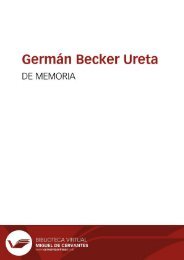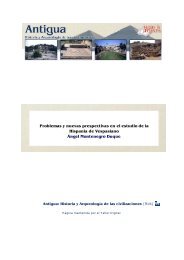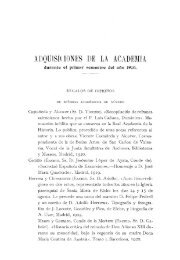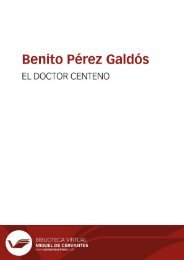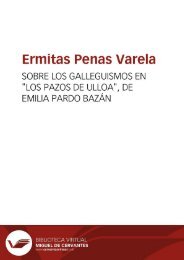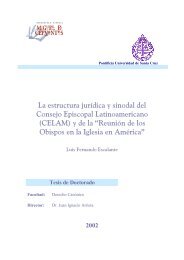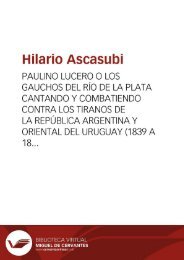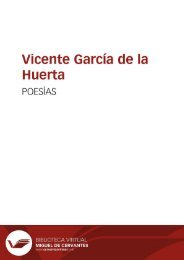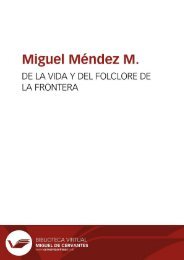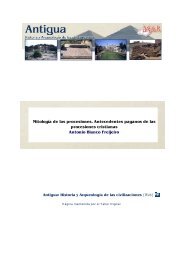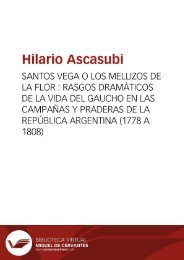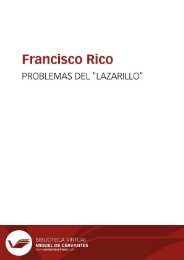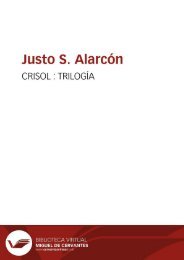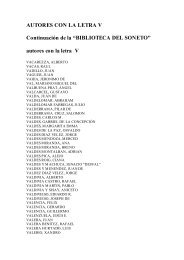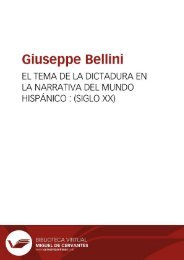You also want an ePaper? Increase the reach of your titles
YUMPU automatically turns print PDFs into web optimized ePapers that Google loves.
Anales galdosianos [Publicaciones periódicas]. Año XII, 1977<br />
clases, mejor dicho, la concordia y reconciliación de todas ellas » 216 . But Fortunata gives the lie<br />
to this farce, for she is exploited by Juanito and denied the possibility of marrying him because she<br />
is a mujer del pueblo . That is, she is excluded from the supposed organic social order because of<br />
her class origin.<br />
Fortunata does not accept this exclusion, and in her struggle to overcome it, she articulates an<br />
alternative to the status quo. A crucial part of her struggle involves the working out of the internal<br />
contradiction between her desire to be honrada and her intense love for a man who is not her husband.<br />
This contradiction, which takes different forms (especially her attitudes toward Jacinta), is based on<br />
her temporary acceptance of the bourgeois definition of honradez . Thus the social dynamic of the<br />
class struggle is expressed both in interpersonal conflicts (between Fortunata and her middle class<br />
companions) and in the internal conflict of the protagonist. And when, through her idea , Fortunata<br />
succeeds in resolving the internal conflict, she also resolves the interpersonal conflict. She overcomes<br />
the barriers society had placed in her way as the Santa Cruz are obliged to recognize her son as the sole<br />
« hijo de la casa ». Moreover, her success leads to changes in the «social order» of the novel. Jacinta<br />
rejects Juanito and begins to imitate Fortunata's language and thoughts; Fortunata has given Jacinta<br />
not only the much desired child, but also a new awareness. The conclusion of the novel therefore<br />
suggests the possibility of a social rebirth based on a genuine overcoming of class barriers.<br />
In Fortunata y Jacinta , then, the question is asked: can the values and vitality of the pueblo ,<br />
which Fortunata typifies, renovate society? The hypothesis is worked out in the following way: the<br />
false order of bourgeois society is challenged by Fortunata who in her struggle must overcome<br />
internal and interpersonal contradictions as she articulates an alternative order . Thus the answer<br />
to the question is a tentative yes, but only after a long and hard struggle. This fictional hypothesis is<br />
rooted in <strong>Galdós</strong>'s understanding of the class struggle, and Fortunata y Jacinta probably represents<br />
his most profound treatment of this social dynamic. Yet this is not a revolutionary novel, for Fortunata<br />
brings the possibility of redemption -and not revolution- to bourgeois society. Her son is the product<br />
of the union of the pueblo and the bourgeoisie and not of the overthrow of the latter by the former.<br />
Furthermore he will grow up in bourgeois surroundings, regardless of how Jacinta's new awareness<br />
may change them. Finally, her death is presented in the context of a religious sacrifice. Thus in spite<br />
216 Benito Pérez <strong>Galdós</strong>, Obras completas , vol. V., ed. Sainz de Robles (Madrid: Aguilar, (1950),<br />
p. 65.<br />
160



